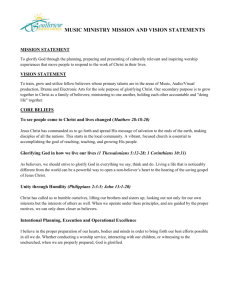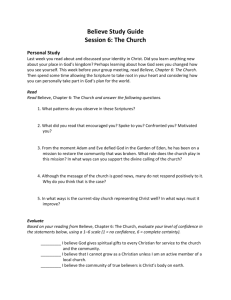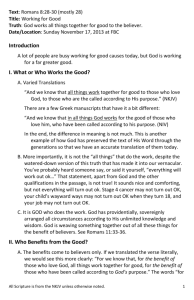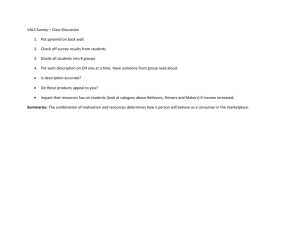Near to the Heart of God: A Study of the Book of Hebrews
advertisement
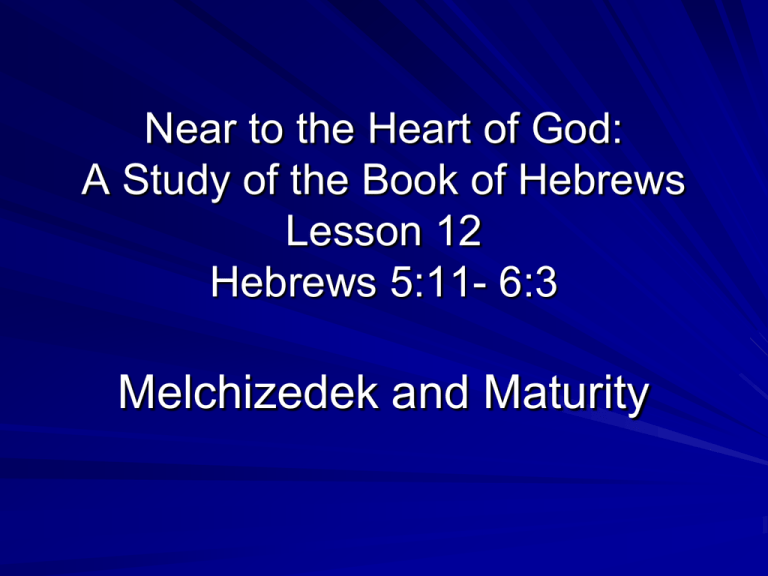
Near to the Heart of God: A Study of the Book of Hebrews Lesson 12 Hebrews 5:11- 6:3 Melchizedek and Maturity I. Introduction A. Two lines of thought have converged thus far in the Book of Hebrews. 1. The supremacy of Christ a. God’s final word (1:1-4) b. Vastly superior to angels (1:4-14) c. Greater than Moses (3:1-6) d. Greater priest than Aaron (4:14ff.) 2. The deficiency of men a. Paradise lost (2:5-8) b. Enslaved by fear of death (2:14-15) c. Israel’s failure in wilderness (3:7f:10) The sufficiency of Christ High Priestly Ministry: The Incarnation Atonement Help in need The deficiency of men I. Introduction B. Christ as the superior high priest (4:14ff.) 1. Hold fast our confession(4:14-15) 2. Draw near for help (4:16) 3. Christ has superior qualifications to Aaronic priesthood (5:1-9). 4. Christ’s priesthood is of the order of Melchizedek (5:6, 10). C. Parenthetical Pause: A message of motivation (5:11-6:20) 1. 5:11-6:3 – A cure for sluggish saints 2. 6:4-8 – Those beyond repentance 3. 6:9-12 – Convinced of better things 4. 6:13-20 – Standing on the promises I. Introduction D. The structure of our text 1. The author’s assessment (5:11-14) 2. The author’s approach (6:1-3) E. The importance of our text 1. It assesses our maturity 2. It prefaces a problem passage (6:4-8) F. My approach in this lesson 1. Answer several crucial questions concerning our text 2.Suggest areas of contemporary application II. Answering the crucial questions A. To whom is the author speaking? 1. Earlier exhortations are to believers (see 4:11-16) 2. These are Jewish / Hebrew believers. 3. Three tests a. Hearing = dull /sluggish in hearing (vs. 11; see 2:1-4) b. Time = should be teachers by now, but aren’t (vs. 12a) c. Diet = milk, not meat (vss. 12b-14; see also 1 Cor. 3:1-3; 1 Peter 2:1-3) 4. The author’s follow-up in 6:9-12 (note repetition of “sluggish” in 6:12) II. Answering the crucial questions B. What is the malady of these believers? 1. Note: This is the first clear indication of the problem of these Hebrew recipients. 2. They need Milk a. According to Peter this is good (2:1-3). b. According to Paul it is not (1 Cor. 3:1-3). c. According to our author it is not (5:11-6:3) 1) An indication of poor health 2) Can’t get past the Old Testament 3) Due to ignorance of “the message of righteousness” (vs. 13) 4) The desire for / need of beginning elements of God’s utterances (5:12) 5) A need for ABC’s about Christ (6:1) II. Answering the crucial questions B. What is the malady of these believers? 3. What must be left behind (6:1-3)? a. The elementary instructions about Christ b. The foundation that was laid 1) Repentance from dead works / faith in God 2) Baptisms (washings) / laying on of hands 3) Resurrection / eternal judgment c. We must progress beyond these to gain maturity 1) Mathematics (algebra to calculus) 2) Apollos (Acts 18:24-28) II. Answering the crucial questions B. What is the malady of these believers? 4. Known Jewish problems a. In 1 & 2 Corinthians b. In Colossians 2 c. In 1 Timothy 1:4-11; Titus 1:10-16 d. In Galatians 5. Conclusion: Many of the Hebrew believers were lingering in the “shadows” of the Old Testament, rather than walking in the light of the substance of the New. a. It did not require any dramatic change in behavior or application or association. b. It avoided persecution. c. It seemed to retain a Jewish superiority II. Answering the crucial questions C. Why “Therefore” in 6:1, instead of “Nevertheless”? (Why does the author press ahead with meat, when they live on milk?”) 1. Part of the answer will come in 6:4ff. 2. Because of what the author has already said in chapters 1 and 2. a. God has spoken fully and finally in His Son (1:1-4) b. We must listen more carefully (2:1-4). 3. We should understand the shadows in terms of the substance (see Ephesians 3). 4. People are not challenged to grow by “lowering the bar.” 5. Melchizedek is the meat they need to grow. III. Conclusion and Application A. The test of true maturity: not just what we know, but what we do with what we know. (This is also true of judgment – Luke 12:44-48) B. How mature am I, according to God’s standard? C. What needs to change? 1. Realize that we need maturity 2. Teaching should have more meat. 3. Maturity means growing less dependent on teachers, and being able to teach. 4. Beware of the “safe zone.” Maturity means greater discernment, and the courage to be different. III. Conclusion and Application D. Application for Jewish believers 1. Pressing Gentile believers into Jewish mold 2. Living in the past, as though it is better 3. Failure to see the New Covenant as better 4. The temptation to go “back to Egypt” 5. The example of Matthew’s Gospel E. Application for Gentile believers 1. The gospel means dramatic change (for example, the Book of Ephesians) 2. Do we mix patriotism with piety, glorify the past, and strive to go back? 3. Don’t confuse culture with Christianity. 4. Watch out in the coming election.
